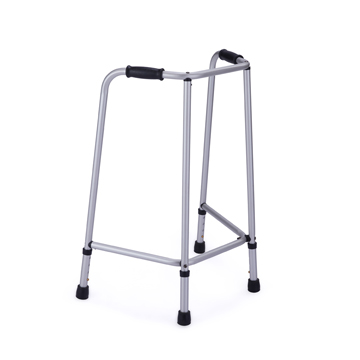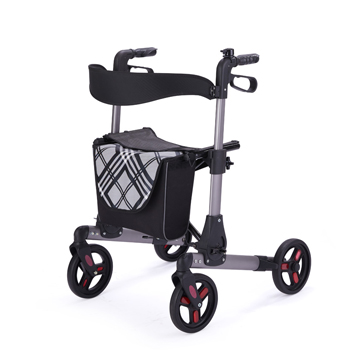Home > About Us > Blog > Company News > Walker vs. Rollator: How to Choose the Best Walking Aid for You?
May. 14, 2021
If you have become tired on long walks, suffer from conditions that impair balance, gait, or leg strength, or are recovering from a lower extremity injury or surgery, you may need a mobility aid to help you get around.
But how do you choose the right mobility aids? When the terms "walker" and "rollator" are used interchangeably, how do you know which device you need? How do you make the right choice if you need help to maintain your independence?
The mobility aids supplier is here to help you.
The difference between a walker and a rollator is wheels.
A walker has four legs, and all four legs stay in contact with the ground when you are moving. The walker must be lifted in order to move forward.

Walker
Walkers aren't as easy to move and navigate, but they are more stable since all four legs stay on the floor, making a walker the better choice if you have issues with balance. Walkers can also partially support your weight while you are walking or standing.
The legs of the walker do not have wheels.
Attachments are provided to allow the walker to slide forward
Must lift the walker and lower it before moving forward
It can be used to support some of the weight
Does not have a seat
Walker helps balance while walking
Some walkers have two wheels on the front.

Rollator
A rollator is often called a "rolling walker with a seat". A rollator has four wheels and brakes and does not need to be lifted to move forward. Rollators are easy to maneuver because the wheels swivel. Rollators tend to be large, making it difficult to operate inside small apartments or narrow hallways.
Rollators are also called rolling walkers, wheeled walkers, and medical rolling walkers.
All legs of the rollator have wheels.
Wheels slide the rollator forward, so the unit does not need to be lifted to move forward.
It should not be used to support bodyweight because this can result in falls.
Rollators have a seat, and some have removable backs for balance while sitting.
Rollators can not be used for balance while walking.
Walkers are best for users that need stable support and walk at a slower pace. If you are mobile enough to walk instead of using a wheelchair but have difficulty walking from your bedroom to your bathroom, a walker might be the right choice for you. A walker is also a good solution for recovering from hip or knee replacement surgery who can't bear weight on one leg.
A rollator is best for users who can walk but need a little help with balance and stability. Rollators allow you to walk at a quicker pace and help with a normal gait. The user should be able to steer the rollator and operate the hand brakes as needed. Most rollators have a seat, allowing you to take a rest as needed.
Genteel is a professional manufacturer dedicated to designing, developing, and producing rehabilitation medical equipment specializing in rollators, walkers, patient lifts, shower chairs, home-care beds, and crutches. If you want to get more information about mobility aids for sale, please contact us.